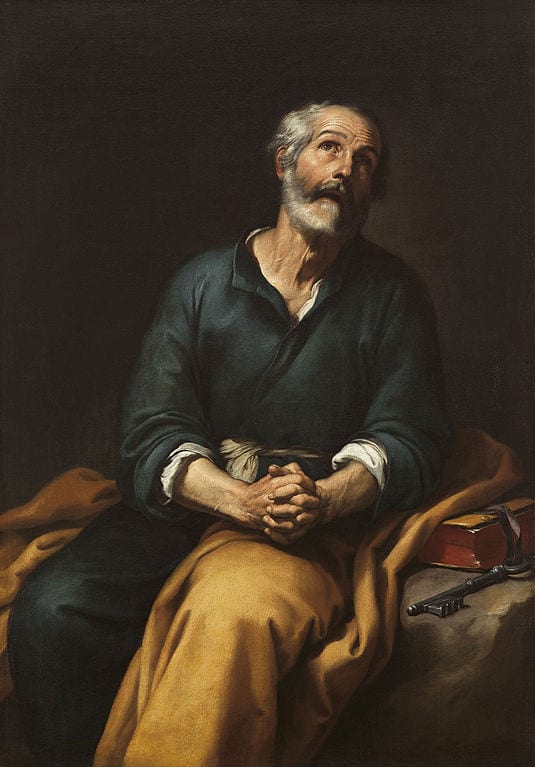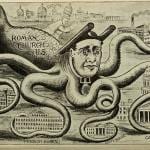
Anti-Catholic Protestant polemicist Jason Engwer and I have debated questions like this several times. I wrote one of my better-known papers in 1994, as an article in The Catholic Answer. It was in my first book in 1996 and has been on my blog from its beginning in 1997:
50 New Testament Proofs for Peter’s Primacy & the Papacy
Jason critiqued it and I counter-responded:
Reply to Critique of “50 NT Proofs for the Papacy” [3-14-02]
Then he did a semi-satirical piece, in response to my arguments in this vein, arguing for a “Pauline papacy” rather than a Petrine papacy, and I refuted that as well:
Refutation of a Satirical “Pauline Papacy” Argument [9-30-03]
Yesterday on his blog, Tribalblogue, he brushed off a similar piece, and opined (his words in blue henceforth):
Andrew Before Peter
If, then, any one came, who had been a follower of the elders, I questioned him in regard to the words of the elders,—what Andrew or what Peter said, or what was said by Philip, or by Thomas, or by James, or by John, or by Matthew, or by any other of the disciples of the Lord, . . .
First of all, my argument in this regard, and that of, I submit, likely most Catholic apologists who use it, is a biblical argument, not a patristic one. I think Jason would readily agree that Scripture is inspired revelation, whereas patristic utterances are not, so they are in different categories, to put it mildly.
Secondly, note where St. John is in Eusebius’ list. It hardly makes sense to rank Andrew higher than John (let alone Peter), or for Philip or Thomas to be regarded as “higher” than St. John. So this argument is a non-starter.
Jason linked yesterday to his article, “Peter Is Always Listed First” (11-23-14), to which I will now respond.
Peter Is Always Listed First …except when he isn’t.
“Paul…Apollos…Cephas…Christ” (1 Corinthians 1:12)
“the rest of the apostles…the brothers of the Lord…Cephas” (1 Corinthians 9:5)
“James…Cephas…John” (Galatians 2:9)
1 Corinthians 1:12 is not a list of the apostles in the first place (obviously not, since Jesus Christ is included), so it is a non sequitur in this discussion. Paul was commenting upon how different Christians were followers of different persons.
1 Corinthians 9:5 is also not a list and is equally irrelevant, except for the fact that Peter (“Cephas”) is singled out by name, which implies, if anything, that he is preeminent. Otherwise, why mention his name and none of the others’ names? This argument was in my original list of 50 Petrine arguments:
34. Peter is often spoken of as distinct among apostles (Mk 1:36; Lk 9:28,32; Acts 2:37; 5:29; 1 Cor 9:5).
Jason, completely missing this aspect, takes another tack:
Similarly, Peter’s last position in 1 Corinthians 9:5 can’t be explained by an appeal to ascending authority. It would be ridiculous to argue that the brothers of the Lord had more authority than the apostles.
No one I know is making such an argument in the first place, so it’s neither here nor there.
Jason wrote, later in this article:
What if 1 Corinthians 1:12 is listing individuals in ascending order, so that Peter had the highest rank below Christ? That’s doubtful, given that Apollos would then be above Paul. In 1 Corinthians 3:4-6, Paul changes the order between Apollos and himself from one verse to another. And any appeal to alleged Pauline humility to explain Paul’s position in the list of 1 Corinthians 1:12 wouldn’t explain why Paul so often mentions himself first, such as in the passage I cited above from 1 Corinthians 3. It’s doubtful that Apollos would be above Paul in an ascending list, and it’s doubtful that humility led Paul to place himself below Apollos. Most likely, the list in 1 Corinthians 1:12 isn’t placing the individuals in an order of authority.
He thus effectively refutes himself. This isn’t a “list” per se at all: certainly not of rank, since Apollos couldn’t possibly be higher than Paul, and so it’s irrelevant to the present discussion. Thanks, Jason!
I noted in my original paper:
4. Peter’s name occurs first in all lists of apostles (Mt 10:2; Mk 3:16; Lk 6:14; Acts 1:13). Matthew even calls him the “first” (10:2). Judas Iscariot is invariably mentioned last.
5. Peter is almost without exception named first whenever he appears with anyone else. In one (only?) example to the contrary, Galatians 2:9, where he (“Cephas”) is listed after James and before John, he is clearly preeminent in the entire context (e.g., 1:18-19; 2:7-8).
36. Peter’s name is always the first listed of the “inner circle” of the disciples (Peter, James and John – Mt 17:1; 26:37,40; Mk 5:37; 14:37).
Commenting further on Galatians 2:9 in a combox comment, I observed:
In ten places in the New Testament (RSV), Peter is listed first whenever he is mentioned along with James and John, and sometimes, in addition to them, other disciples as well:
Matthew 10:2 The names of the twelve apostles are these: first, Simon, who is called Peter, and Andrew his brother; James the son of Zeb’edee, and John his brother;
Matthew 17:1 And after six days Jesus took with him Peter and James and John his brother, and led them up a high mountain apart.
Mark 5:37 And he allowed no one to follow him except Peter and James and John the brother of James.
Mark 9:2 And after six days Jesus took with him Peter and James and John, and led them up a high mountain apart by themselves; and he was transfigured before them,
Mark 13:3 And as he sat on the Mount of Olives opposite the temple, Peter and James and John and Andrew asked him privately,
Mark 14:33 And he took with him Peter and James and John, and began to be greatly distressed and troubled.
Luke 6:14 Simon, whom he named Peter, and Andrew his brother, and James and John, and Philip, and Bartholomew,
Luke 8:51 And when he came to the house, he permitted no one to enter with him, except Peter and John and James, and the father and mother of the child.
Luke 9:28 Now about eight days after these sayings he took with him Peter and John and James, and went up on the mountain to pray.
Acts 1:13 and when they had entered, they went up to the upper room, where they were staying, Peter and John and James and Andrew, Philip and Thomas, Bartholomew and Matthew, James the son of Alphaeus and Simon the Zealot and Judas the son of James.
Galatians 2:9 is an exception: “James and Cephas and John”. I would guess it is because James was the bishop of Jerusalem. Even so, in the preceding verses (2:7-8) and ones after (2:11-14), only Peter is referred to. And again, Paul refers to him alone in the similar circumstance described in Galatians 1:18: Then after three years I went up to Jerusalem to visit Cephas, and remained with him fifteen days.” He adds, almost as a sort of “footnote” in the next verse: “But I saw none of the other apostles except James the Lord’s brother.”
What if Galatians 2:9 has Peter in the center (the second of three) because of his central authority?
Galatians 2:9 is more than adequately explained by the fuller context, as I just argued above.
Catholics often argue for the papacy by citing Peter’s position at the beginning of lists of the disciples in the gospels and Acts (Matthew 10:1-4, Mark 3:13-9, Luke 6:12-6, Acts 1:13). But why cite those lists and not others, like the ones I’ve quoted above? And why think that Peter’s position in the lists represents his rank in the church? . . . Why should we think that Peter’s position in lists about the pre-Pentecost era reflect the jurisdictional rank of Peter and his alleged successors throughout church history?
Precisely because the argument is about lists of disciples and the scriptural habit of always making St. Peter the first listed in them: which seems to me to clearly imply primacy, along with the many other indications of papal primacy in Scripture, as outlined in my 50 New Testament Proofs article. None of Jason’s three supposed counter-examples are lists of the twelve disciples.
Some Protestant commentaries, expressing exegetical opinions about Matthew 10:2: one of these lists of the disciples, where Peter is first, as always, rendered the opinion that this was not because of primacy or preeminence, but because of being the first disciple called by Jesus. But Peter was not the first one called: Andrew was:
John 1:37-41 The two disciples heard him say this, and they followed Jesus. [38] Jesus turned, and saw them following, and said to them, “What do you seek?” And they said to him, “Rabbi” (which means Teacher), “where are you staying?” [39] He said to them, “Come and see.” They came and saw where he was staying; and they stayed with him that day, for it was about the tenth hour. [40] One of the two who heard John speak, and followed him, was Andrew, Simon Peter’s brother. [41] He first found his brother Simon, and said to him, “We have found the Messiah” (which means Christ).
The second would-be disciple here was probably St. John, because of John’s habit throughout his Gospel of not naming himself (sometimes referring to himself as “the disciple whom Jesus loved”: 13:23; 20:2; 21:7, 20). Assuming this to be true, he would be a second disciple called before St. Peter.
Other prominent Protestant commentaries (at Matthew 10:2), over against Jason’s casual dismissal, agree that Peter being listed first was a significant factor, leading one to conclude that he was the leader of the disciples:
A comparison of the four lists of the Apostles (Matthew 10:2-4, Mark 3:16-19, Luke 6:13-16, Acts 1:13) brings out some interesting facts. (1.) The name of Peter is always first, that of Judas always last. In the former case we recognise acknowledged preeminence. (Ellicott’s Commentary for English Readers; my bolding)
The first is Simon. The further numbering of them ceases, for Matthew mentions them in pairs. The placing of Peter first in all the catalogues of the apostles (Mark 3:16 ff.; Luke 6:14 ff.; Acts 1:13) is not accidental (Fritzsche), . . . This accords with the pre-eminence which he had among the apostles as primus inter pares (Matthew 16:16 ff., Matthew 17:1. Matthew 24:19, Matthew 27:26; Matthew 27:37; Matthew 27:40; Luke 8:45; Luke 9:32; Luke 22:31 f.; John 21:15; Acts 1:15; Acts 2:14; Acts 5:3 f., Matthew 8:14, Matthew 10:5, Matthew 15:7; Galatians 1:18; Galatians 2:7), and which was recognised by Jesus Himself. For that they were arranged in the order of their rank is perfectly obvious, not only from the betrayer being uniformly put last, but also from the fact that in all the catalogues James and John, who along with Peter were the Lord’s most intimate friends, are mentioned immediately after that apostle (and Andrew). (Meyer’s NT Commentary; my bolding)
[A]t the head of the list stands Peter, first not only numerically (Meyer) but in importance, a sure matter of fact, though priestly pretensions based on it are to be disregarded. He is first in all the lists. (Expositor’s Greek Testament; my bolding)
. . . Peter is named first, not without an indication of rank . . . on the primacy of Peter, see Luke 8:45; Luke 9:32; John 1:42; Matthew 16:16; John 21:15; Acts 1:15; Acts 2:14; Acts 8:14; Acts 10:5; Acts 15:7. (Bengel’s Gnomen; my bolding)
Of the twelve (ver. 1, note) apostles (ver. 5, note) are these: The first. This, perhaps, refers to the order of call, Luke 5:1 (Nosgen), but more probably to the leading position that St. Peter held among the twelve. (Pulpit Commentary; my bolding)
The four lists in the gospels and Acts consistently have Peter first and Judas last, except for the list in Acts, in which Judas is irrelevant, but the lists are inconsistent in the middle.
Ellicott’s Commentary (on Matthew 10:2) notes in this regard:
(2.) All the lists divide themselves into three groups of four, the persons in each group being always the same (assuming that the three names, Judas the brother (?) of James, Thaddæus, and Lebbæus, belong to the same person), though the order in each group varies.
(3.) The first group includes the two sons of Jona and the two sons of Zebedee, whose twofold call is related in Matthew 4:18-21, John 1:40. In two lists (Mark and Acts) the name of Andrew stands last; in two (Matt. and Luke) that of John.
I think that is all the more reason to think that Peter always being first means something, as indeed, many Protestant commentators (such as the five cited above) have agreed. Other names appear in different places in the lists (to an extent, within sub-groups, yet Peter is always the first listed: the one certain constant. Surely this is significant.
Why is Judas consistently last? Because he had the lowest church office, with less jurisdiction than the other disciples? No, he’s probably listed last because of his bad character and bad behavior.
That’s a no-brainer everyone can agree on.
Similarly, there could be one or more non-papal reasons for listing Peter first.
Well, Jason, you tell us. You’re the king of throwing out doubts and cynical comments about Anything Catholic (gasp!!!!), but it’s a far different thing to actually produce a plausible, superior thesis to the one accepted by most (that Peter was the leader of the disciples and the early Church). The Protestant commentaries I cited gave us no other reason, except Peter supposedly being called first (which is factually untrue). They agreed. And I think they do because the conclusion they arrive at is rather obvious and indisputable.
In their disciple lists, Matthew and Luke pair Peter and Andrew, whereas Mark doesn’t. Most likely, Matthew and Luke pair the two because the next two listed, James and John, were also brothers. One pair of brothers reminded them of another. Something that insignificant, which has nothing to do with the ranking of church offices, can affect how a list is composed. Likewise, given Peter’s leadership qualities, such as his outspokenness, impulsiveness, and willingness to take risks, it’s easy to see him standing out in people’s minds without the involvement of any papal office.
Now Jason is playing the game that many Protestants play, that I relentlessly critiqued in my book, The Catholic Verses: trying to have it both ways, in attempting to rationalize away clear “Catholic verses.” He acknowledges Peter’s “leadership qualities” while naturally (as a good anti-Catholic) eschewing any association whatsoever (heaven forbid!) with “any papal office.”
At this point in the argument however, the usual Catholic apologetics argument is not (technically or logically) to “prove” that Peter was the first pope; rather, only that he was preeminent among the apostles. Many Protestants and also the Orthodox agree with us on that, while strictly disagreeing with any notion of a pope or ongoing papal office, as indicated by Petrine primacy.
There are some ways Catholics could attempt to get around the passages I quoted at the opening of this post. I’ll address those potential counterarguments below. But even if we accepted those counterarguments, what I’ve outlined above demonstrates that Peter’s alleged papal authority would remain unproven even if he consistently had the position in lists that Catholics claim he had.
It may be technically “unproven”: especially among Protestants who accept the altogether unbiblical notion and tradition of men: that all doctrines accepted by Christians must be explicitly laid out in Scripture. But it is sure consistent with the concept of a papacy, when all the Petrine data is considered as an accumulation of evidences.
If papal authority is supposed to be implied by coming first in a list, by coming last, and by being in the middle, doesn’t that sort of argumentation prove anything and, thus, really prove nothing? If Peter had actually been a Pope, Catholics most likely wouldn’t have to resort to the kind of argumentation they’ve been left with.
The arguments have been made above, including substantial Protestant commentary agreement. Jason’s endless cynical questions have not overcome them. It remains a strong argument, profoundly supported by Scripture again and again. Everything in Scripture is important, and there for a reason.
If you want some examples of Biblical passages that truly reflect the ranking of the apostles, go to 1 Corinthians 12:28, Ephesians 2:20, and Revelation 21:14. The apostles are equals who, together, possess the highest rank in the church.
These are equally irrelevant to our discussion, being merely lists of various Church offices, not the rank among the disciples and apostles: one such group.
Jason shows himself yet again, not just the Cynical King, but the King of the Non Sequitur: hardly a prestigious honor.
***
Photo credit: Saint Peter in Tears, by Bartolomé Esteban Murillo (1617-1682) [public domain / Wikimedia Commons]
***













